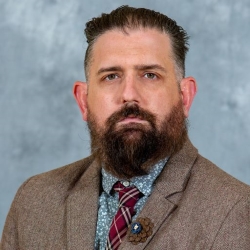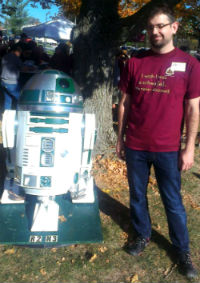Inside the Linguist's Toolbox
 The first thing you notice when you enter Dr. Jeff Punske’s office is that there is a sonic screwdriver on his desk. And you think, Yes, I’ve come to the right place. Surely this is a tool which no good linguist should be without.
The first thing you notice when you enter Dr. Jeff Punske’s office is that there is a sonic screwdriver on his desk. And you think, Yes, I’ve come to the right place. Surely this is a tool which no good linguist should be without.
New to the program this year, Dr. Punske also serves as Director of Undergraduate Studies. Sensitive to the serious debates within the science, he also displays a keen sense of fun. This spring he will teach a course titled “Invented languages and fictional worlds,” and a historical course on how words evolve. One is willing to bet that there are cookies in the TARDIS which sits on a low table near his desk, too.
One of the things he plans to do in the upcoming course on invented languages is to look at ideas of language ideology—how we think language is acquired. For, whatever scholarship has made known, “there’s so much unknown about language, still.”
 (Pictured at left: Dr. Punske attends SIU Homecoming 2014 alongside a familiar-looking droid known for his own curious syntax of 'bleeps' and 'bloops.')
(Pictured at left: Dr. Punske attends SIU Homecoming 2014 alongside a familiar-looking droid known for his own curious syntax of 'bleeps' and 'bloops.')
Working primarily within the system of distributive morphology, Dr. Punske subscribes to the theory that word building and sentence building are all the same process. He notes that we often employ one word to express a sentence’s worth of meaning. Consider this festive example from Chuckchee: təqorapelarkən “I am in the process of reindeer-leaving.”
Lately Dr. Punske has been working with idioms, and recently presented a lecture on the syntax of idioms which was sponsored by SLING, the linguistic students’ club. He argues that, contra Chomsky, “idioms rightly belong with the core of language,” and are not merely added-on anomalies.
Why is the study of linguistics so important? Because, as Dr. Punske will tell you, about 90 percent of the world’s languages are in danger of extinction.” This is owing to at least three factors: a history of colonialism; genocides past and present; and economic factors, which can drive adoption of a dominant language in a bilingual family, for example.
The idea that you must be a language savant in order to be a linguist is a myth, according to Punske. He has explored, among others, German, Russian, Polish and, now, Farsi—but he insists that he is by no means a polyglot. Instead, he knows a lot about languages in general.
--L.A. Brown
